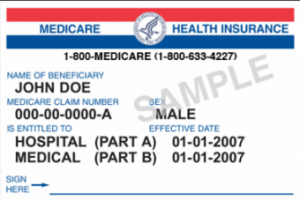What is Medicare?

Medicare is the health insurance program managed by the federal government that offers medical coverage to individuals eligible.
Those who have paid 10 years of Social Security taxes can apply for Medicare when turning 65. Individuals under 65 can qualify be Medicare eligible if you have certain disabilities and meet the requirements.
The “Affordable Care Act” and healthcare exchange does not apply to individuals on Medicare. Generally, you need to go on Medicare when first eligible and drop your individual coverage.
How Does Medicare Work?
Understanding Medicare and how it works sets the foundation for selecting the best health insurance plan for your needs. Medicare covers medically necessary healthcare services.
Medicare has an annual hospital and medical deductible. Then copayments and coinsurance apply.
Medicare Doctors Network
Original Medicare allows you to see doctors and hospitals across the country who accept Medicare. No more worrying about networks, such as an HMO or PPO.
Different Parts of Medicare
Medicare is divided into Parts A, B, C, and D.
Medicare Part A and Medicare Part B is called “Original Medicare.” Original Medicare provides coverage and access to doctors, hospitals, and other medical healthcare expenses.
Part A (Hospital)

At age 65, Medicare Part A is automatically given to people who have worked and paid taxes.
What does Medicare Part A cover?
- Inpatient care in hospitals
- Skilled nursing facility care
- Hospice
- Home health care
Part B (Medical)
Medicare Part B has an annual deductible. Most services are 80/20 coinsurance. Medicare pays 80% while you are responsible for the remaining 20% coinsurance after the Part B deductible is met.

Part B covers:
- Doctors and Specialist services
- Outpatient care
- Home health care
- Durable medical equipment
- Preventive services
There is a standard Medicare Part B premium.
Part D – Prescription Drug Coverage

Part D coverage:
- Cost of prescription drugs
- Run by private insurance companies that are Medicare-approved
- Protection against high cost prescription drugs
- May help lower prescription drug costs
Prescription drug plans depend on the service area people live in. The best way to find companies who offer Part D plans in your area is to go to Medicare’s website (Medicare.gov) or call 1-800-Medicare.
Part C (Advantage)
Part C coverage:
- All benefits and services that are covered under Part A and B
- Run by private insurance companies that are Medicare-approved
- Part C usually includes prescription drug coverage (Part D) built into the plan
- Part C may include benefits and services that go beyond Medicare for an extra cost
Individuals who enroll into an Advantage Plan (Part C) still have Medicare, but the Advantage Plan pays instead of Medicare.
Individuals must be enrolled into Medicare Part A and Part B to apply for Part C.
Supplemental Coverage with Original Medicare
These plans fill the gaps left behind by Original Medicare.
Find Medicare Supplement coverage.
- Check the “Medicare & You Handbook” for Medicare Insurance Coverage and Benefits
